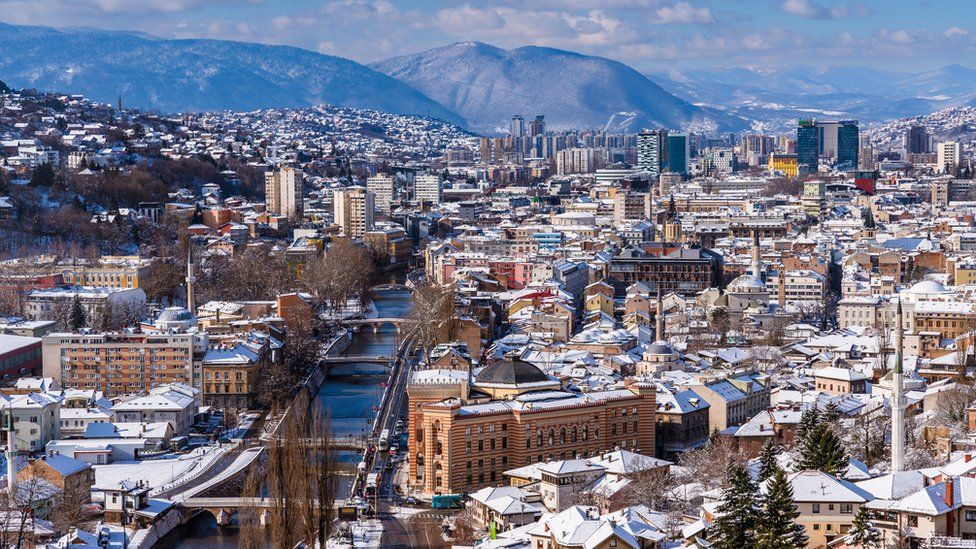Bosnia-Herzegovina profile - Timeline
- Published

A chronology of key events:
1908 - Bosnia-Herzegovina, nominally part of the Ottoman Empire, is annexed by Austria-Hungary.
1914 - A Bosnian Serb student, Gavrilo Princip, assassinates Austrian archduke Franz Ferdinand in Sarajevo, precipitating World War One.
1918 - Austria-Hungary collapses at the end of the war. Bosnia-Herzegovina becomes part of the Kingdom of Serbs, Croats and Slovenes.
1941 - Bosnia-Herzegovina annexed by pro-Hitler Croatian puppet state. Thousands of Serbs, Jews and Gypsies are sent to the death camps.
1945 - Bosnia-Herzegovina liberated following campaign by partisans under Tito.
1945-1991- Bosnia is part of Socialist Federal Republic of Yugoslavia.
1991 - Following communism's collapse, separatists win first multi-party elections and form coalition government despite having conflicting goals.
War on many fronts
1992 - Croat and Muslim nationalists form tactical alliance and outvote Serbs at independence referendum.
War breaks out and Serbs quickly assume control of over half the republic. Killings and deportations are rampant in the newly-proclaimed Serb Republic, but also widespread in Muslim and Croat-controlled areas.
1995 - Safe haven of Srebrenica is overrun by Bosnian Serb forces under General Ratko Mladic, who massacre over 8,000 Muslims.
1995 December - Dayton Peace Accord creates two entities, one for Serbs and one for Bosnian Muslims and Croats. The Office of the High Representative is created to oversee its implementation. An international peacekeeping force is deployed.
After Dayton
1996 - The International Criminal Tribunal for the former Yugoslavia begins work in the Hague.
2000 - Moderate parties do well in elections in the Muslim-Croat entity, nationalists gain the upper hand in the Serb entity. Results force main Serb nationalist party to form a coalition headed by moderate Prime Minister Mladen Ivanic.
Krstic sentenced
2001 August - Hague war crimes tribunal finds Bosnian Serb Gen Radislav Krstic guilty of genocide for his role in the massacre of thousands of men and boys in Srebrenica. Krstic sentenced to 46 years.
2002 May - UK politician Paddy Ashdown becomes High Representative.
2002 October - Nationalists win back power in federation presidential, parliamentary and local elections.
EU peacekeepers take over
2004 December - Nato hands over peacekeeping duties to a European Union-led force, Eufor.
2006 December - Bosnia joins Nato's Partnership for Peace pre-membership programme.
2007 February - The International Court of Justice rules that the 1995 Srebrenica massacre constituted genocide, but clears Serbia of direct responsibility.
Karadzic and Mladic arrested
2008 July - Former Bosnian Serb leader Radovan Karadzic arrested on war crimes charges in Belgrade after nearly 13 years on the run.
2011 May - Serbian authorities arrest former Bosnian Serb military chief Ratko Mladic, one of the world's most wanted war crimes suspects.
2011 December - Bosnia's Muslim, Croat and Serb political leaders reach agreement on formation of new central government, bringing to an end 14 months of deadlock since 2010 general election.
2013 May - A UN tribunal finds six former Bosnian Croat leaders guilty of war crimes and crimes against humanity during the 1990s Balkan wars.
2014 May - Extensive flooding leaves a quarter of the population without clean drinking water as 500,000 people are evacuated from their homes.
Steps towards EU membership
2015 March - European Union and Bosnia sign Stabilisation and Association Agreement, raising possibility of Bosnia joining Union. Bosnia formally applies for membership in 2016.
2016 March - UN tribunal in The Hague finds former Bosnian Serb leader Radovan Karadzic guilty of genocide and war crimes - including genocide over the 1995 Srebrenica massacre - and sentences him to 40 years in jail.
2017 November - Former Bosnian Serb military commander Ratko Mladic is found guilty of genocide and crimes against humanity during the Bosnian War. He is sentenced to life imprisonment.
2018 October - Veteran nationalist Milorad Dodik wins Serbian seat on three-member federal presidency. He has proposed that the Serb Republic should secede.
2021 July - High Representative Valentin Inzko imposes a law prohibiting genocide denial over the 1995 Srebrenica genocide in particular, and denial of crimes against humanity and war crimes more broadly. The law draws strong opposition from Serb nationalist leaders in Republika Srpska (RS).
2021 October - Serb nationalist leader Milorad Dodik announces the RS will withdraw from Bosnia's military, its top judiciary body and tax administration, prompting renewed fears of a secession crisis.